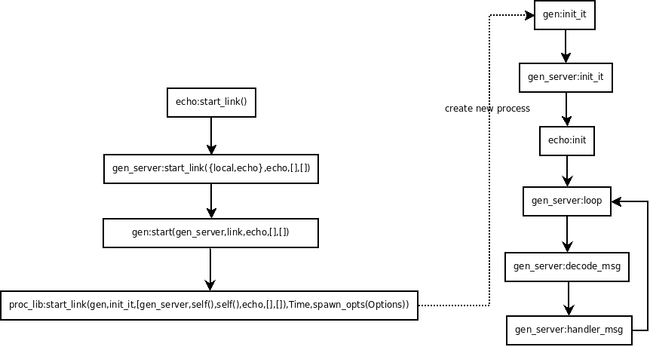otp深入浅出之:gen_server
what is the gen_server ?
man 中 gen_server定义是:
一个简单的echo gen_server
echo gen_server代码的主干可以由模板生成,具体请参google。
运行并测试echo gen_server
how to start a echo gen_server ?

如上图,在主进程中的调用顺序为:echo:start_link->gen_server:start_link->gen:start->proc_lib:start_link
proc_lib:start_link中通过erlang:spawn_link创建echo进程,新进程中依次回调
gen:init_it->gen_server:init_it->echo:init,从而注入echo自己的初始化逻辑。
在gen_server:init_it中分析回调echo:init的返回值,初始化成功以后则进入循环。
how to deal with a call ?
gen_server:call调用gen:call发起一个同步的消息请求,使用标签"$gen_call"作为表示,表示这是应用的消息,不是系统的消息。
在主循环gen_server:loop中从消息队列中依次取出消息并处理,注意这是串行的, 在一条消息处理完毕之前,不会处理下一条消息。
gen_server:decode_msg区分不同消息类型,分别处理
gen_server:handle_msg回调echo:handle_call处理应用信息,处理成功则返回loop方法。
how to deal with a cast ?
how to deal with a info ?
要注意的地方
man 中 gen_server定义是:
引用
A behaviour module for implementing the server of a client-server relation. A generic server process (gen_server) implemented using this module will have a standard set of interface functions and include functionality for tracing and error reporting. It will also fit into an OTP supervision tree.
一个简单的echo gen_server
-module(echo).
-behaviour(gen_server).
%% API
-export([start_link/0]).
-export([echo/1]).
%% gen_server callbacks
-export([init/1, handle_call/3, handle_cast/2, handle_info/2,
terminate/2, code_change/3]).
-record(state, {}).
echo(Msg)->
gen_server:call(?MODULE,{echo , Msg} ).
start_link() ->
gen_server:start_link({local, ?MODULE}, ?MODULE, [], []).
init([]) ->
{ok, #state{}}.
handle_call({echo , Msg}, _From, State) ->
{reply , Msg , State };
handle_call(_Request, _From, State) ->
Reply = ok,
{reply, Reply, State}.
%%其他自动生成部分省略
echo gen_server代码的主干可以由模板生成,具体请参google。
运行并测试echo gen_server
echo:start_link(),
echo:echo("hello world").
how to start a echo gen_server ?

如上图,在主进程中的调用顺序为:echo:start_link->gen_server:start_link->gen:start->proc_lib:start_link
proc_lib:start_link中通过erlang:spawn_link创建echo进程,新进程中依次回调
gen:init_it->gen_server:init_it->echo:init,从而注入echo自己的初始化逻辑。
在gen_server:init_it中分析回调echo:init的返回值,初始化成功以后则进入循环。
init_it(Starter, Parent, Name, Mod, Args, Options) ->
Debug = debug_options(Name, Options),
case catch Mod:init(Args) of
{ok, State} ->
proc_lib:init_ack(Starter, {ok, self()}),
loop(Parent, Name, State, Mod, infinity, Debug);
{ok, State, Timeout} ->
proc_lib:init_ack(Starter, {ok, self()}),
loop(Parent, Name, State, Mod, Timeout, Debug);
{stop, Reason} ->
proc_lib:init_ack(Starter, {error, Reason}),
exit(Reason);
ignore ->
proc_lib:init_ack(Starter, ignore),
exit(normal);
{'EXIT', Reason} ->
proc_lib:init_ack(Starter, {error, Reason}),
exit(Reason);
Else ->
Error = {bad_return_value, Else},
proc_lib:init_ack(Starter, {error, Error}),
exit(Error)
end.
how to deal with a call ?
gen_server:call({local,echo},{echo,"hello,world"}).
gen_server:call调用gen:call发起一个同步的消息请求,使用标签"$gen_call"作为表示,表示这是应用的消息,不是系统的消息。
call(Name, Request) ->
case catch gen:call(Name, '$gen_call', Request) of
{ok,Res} ->
Res;
{'EXIT',Reason} ->
exit({Reason, {?MODULE, call, [Name, Request]}})
end.
在主循环gen_server:loop中从消息队列中依次取出消息并处理,注意这是串行的, 在一条消息处理完毕之前,不会处理下一条消息。
loop(Parent, Name, State, Mod, Time, Debug) ->
Msg = receive
Input ->
Input
after Time ->
timeout
end,
decode_msg(Msg, Parent, Name, State, Mod, Time, Debug, false).
gen_server:decode_msg区分不同消息类型,分别处理
decode_msg(Msg, Parent, Name, State, Mod, Time, Debug, Hib) ->
case Msg of
{system, From, Req} ->
sys:handle_system_msg(Req, From, Parent, ?MODULE, Debug,
[Name, State, Mod, Time], Hib);
{'EXIT', Parent, Reason} ->
terminate(Reason, Name, Msg, Mod, State, Debug);
_Msg when Debug =:= [] ->
handle_msg(Msg, Parent, Name, State, Mod);
_Msg ->
Debug1 = sys:handle_debug(Debug, {?MODULE, print_event},
Name, {in, Msg}),
handle_msg(Msg, Parent, Name, State, Mod, Debug1)
end.
gen_server:handle_msg回调echo:handle_call处理应用信息,处理成功则返回loop方法。
handle_msg({'$gen_call', From, Msg}, Parent, Name, State, Mod) ->
case catch Mod:handle_call(Msg, From, State) of
{reply, Reply, NState} ->
reply(From, Reply),
loop(Parent, Name, NState, Mod, infinity, []);
{reply, Reply, NState, Time1} ->
reply(From, Reply),
loop(Parent, Name, NState, Mod, Time1, []);
{noreply, NState} ->
loop(Parent, Name, NState, Mod, infinity, []);
{noreply, NState, Time1} ->
loop(Parent, Name, NState, Mod, Time1, []);
{stop, Reason, Reply, NState} ->
{'EXIT', R} =
(catch terminate(Reason, Name, Msg, Mod, NState, [])),
reply(From, Reply),
exit(R);
Other -> handle_common_reply(Other, Parent, Name, Msg, Mod, State)
end;
how to deal with a cast ?
how to deal with a info ?
要注意的地方